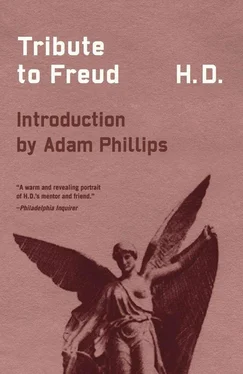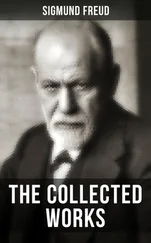Hilda Doolittle
Tribute to Freud
This is no rune nor riddle,
It is happening everywhere;
H. D., Tribute to the Angels
One of H. D.’s last entries in “Advent” — the notebook, reprinted here, that she kept during her analysis with Freud — is about fairy tales. She has been remembering the Greek myths that were read to her when she was seven by a Miss Helen. Those stories, she writes, “are my foundation or background, Pandora, Midas, the Gorgon-head — that particular story of Perseus and the guardian, Athene.” H. D.’s parents were pious Protestants, but like many of her modernist contemporaries she was turning cultures of myth into what Freud had called, in a famous and timely essay, “a family romance.” Disillusioned with the real parents, the child chooses parents she would prefer to have had — typically grander, more impressive ones — and believes they are in fact her parents. The family history is complemented as it were by other histories; genealogies are chosen, inheritances are found and fashioned. Not satisfied imaginatively by the religion of her parents, H. D. found other myths (and indeed wonders several times during her analysis with Freud whether she will be the founder of a new religion). H. D., it seems, from a very young age, was seeking alternative foundations and backgrounds. She was using what she could find to tell her own stories.
H. D. became a writer with an extraordinary gift for finding and forming the connections and affinities she needed to articulate her vision. There was Christianity, Greek, and Egyptian mythology — she would write a book-length poem entitled Helen in Egypt: she was always a born Freudian in her ability to so freely associate — and then there was her encounter, as a middle-aged woman, with Freud, and his Jewish history. For Freud, as for H. D. there was something belated and diminishing about Judeo-Christian culture (“The Professor said that we two met in our love of antiquity”) but there was something about all religions, all mythologies, all compelling fictions that needed, in Freud’s view, to be interpreted, to be redescribed. New links needed to made between apparently disparate phenomena; between, say, spell-binding parents and entrancing gods, between symptoms and inspiration, between sexuality and hope. As H. D. herself realized they were both, as modernist writers, wanting a revitalization of culture, a renewal through language. For Freud, and for H. D. in the troubled period of her life recounted in this book, psychoanalysis was a means to this, but not an end. It was not a new religion, but a method; a method summed up in H. D.’s brief reference to fairy tales in her notebook:
The miracle of the fairy tale is incontrovertible; Sigmund Freud would apply, rationalize it.
It is an apparently simple remark, but like many of the sentences in this book that is a unusual mixture of poetry and prose, it needs noticing. If something is incontrovertible it can’t be opposed, or argued against, or disputed, or denied (and the controversy that was psychoanalysis is somewhere in the background here); Sigmund Freud — his whole name authorizing the point — would “apply, rationalize it,” acknowledge the miracle by transforming it, by seeing it as a metaphor for something that matters (the wish to change, and to change the world); a mere comma separating the two words suggests that to apply might also be to rationalize, which may not necessarily be a bad thing. “Rationalization” has received bad press largely because of psychoanalysis, but it is worth remembering, as H. D. does here, that in Freud’s minting of the word we only rationalize things that are disturbing and important. Our rationalizations are our personal mythologies.
So what would it be to apply, to rationalize a miracle? That is H. D.’s question, in a book riddled with questions and answers (she calls Freud her “answerer,” but is also clear that the aim of psychoanalysis is to enable the patient to find and formulate her own questions, and not be fobbed off with answers that can’t work because they don’t). Freud, in H. D.’s view, is not exactly disputing the miracle of the fairy tale, he is using it differently; as a poet might use, or apply, a myth. This is what H. D. went to see Freud for: to find new applications, new rationalizations — bearable redescriptions of unbearable things — for the material that mattered most to her. This material was her recent traumatic history, and the mythologies and symbols which she had made and used to keep herself going. What H. D. wanted to talk about with Freud was her life during one world war and before another, interwoven with childhood memories and dreams; a life in which both her parents and a brother had died, in which she had miscarried, been seriously ill and borne a child; a life in which her marriage and various love affairs had fallen apart, as she herself had, and in which she had made herself a remarkable avant-garde writer (Barbara Guest’s wonderful biography of H. D. tells the story with extraordinary vividness and tact). In Tribute to Freud H. D. tells the story of someone trying to make a new kind of sense of living in the aftermath of a catastrophe, with the (accurate) foreboding of there being another catastrophe in the offing. And one of the many touching things about H. D.’s relationship with Freud in this book is her wish to protect Freud, the great realist, from knowing too much about the Nazi threat. In delegating both her fear of the future and her wish not to know about this fear to Freud she could sustain him in her mind as the powerful figure she needed. The strange title of her remarkable novel about the First World War Bid Me to Live — first written in 1927 — was the demand she brought to Freud.
It is of interest, given her predilection for something like a collective unconscious — what she refers to in her Notes on Thought and Vision of 1919 as the “universal mind” or the “over-mind” — that it was Freud and not Jung or a Jungian that H. D. had wanted to see (you could always tell a Freudian from a Jungian by their attitude to fairy tales). And it is not incidental that Ezra Pound and D. H. Lawrence who had both been immensely influential in H. D.’s earlier life, were in different ways fiercely and determinedly anti-Freudian. Knowing what was good for her, which meant knowing what was good about herself, H. D. could also be undistracted by men. She saw meeting with Freud as an opportunity so she could make it one. Indeed it is one of the many boons and benefits of Tribute to Freud that it makes us wonder why so few of the great modernist writers found Freud’s work useful, or only useful agonistically (H. D. found it both). Tribute to Freud should be read, that is to say, not merely for what it tells us about Freud — though it tells us much that is of great interest — but for what it shows us and tells us about what H. D. made of Freud, and was making of herself; and making of herself through what she could make of Freud.
Freud, as he says to H. D. — and the Freud in his late seventies that H. D. saw was remarkably candid about his work — had “struck oil”; but he had, in H. D.’s view, opened up his discovery rather than confining, or foreclosing, or over-owning it. “He himself — at least to me personally,” she writes “ — deplored the tendency to fix ideas too firmly, to set symbols, or to weld them inexorably. . it was he who ‘struck oil’ but the application of the ‘oil,’ what could or should be made of it, could not be regulated or supervised by its original ‘promoter.’” The unconscious, which H. D. calls “the hieroglyph of the unconscious. . this vast unexplored region,” is an extraordinary resource (at once like oil, and something that oils things); it needs to be deciphered and thus requires trained reading, but not the Jungian fixing of symbols; and it can only be “promoted,” in its several senses, but not strictly defined, or proven. And it is also worth noting how she applies the word “application”; because it is part of her poetic method in this book, as in her poetry — and psychoanalysis is a method only in the sense that poetry is — to reiterate words and phrases and sentences throughout the text, as indeed happens during psychoanalysis. Without repetition there is no improvisation, and no history. And there is no poetry and no psychoanalysis without following the wording, and its patterns of sound and sense. In Tribute To Freud H. D. has the vagrant incisiveness of someone — a writer, in fact, whose writing is an account of a speaking — who can make her associations tell because of her belief in her listener. Freud having, as Foucault remarked, the most famous ears in history.
Читать дальше











